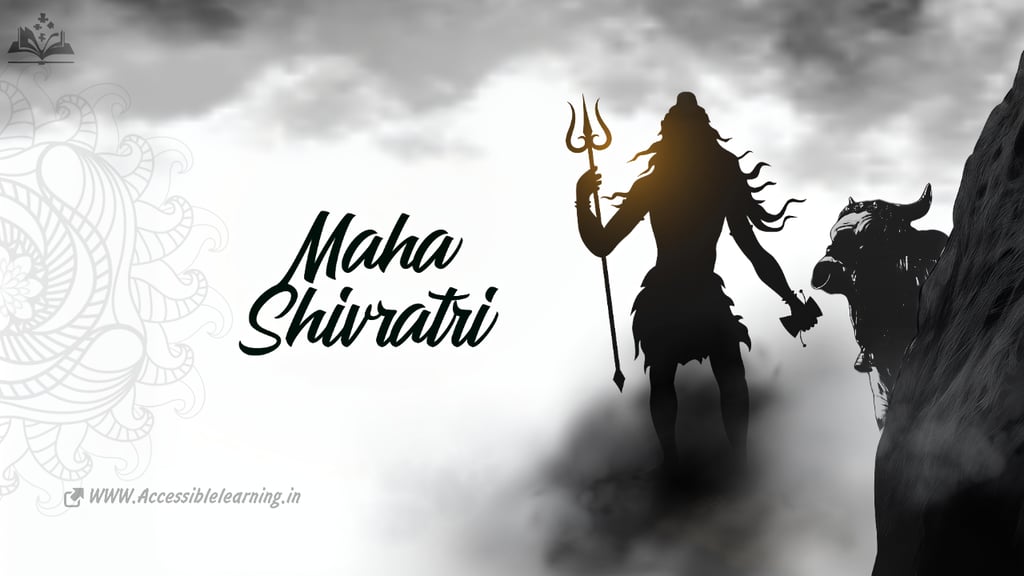
Why Maha Shivratri is a Night of Spiritual Transformation
the profound significance of Maha Shivratri, the Great Night of Shiv Ji. Learn about its spiritual importance, rituals, mythological legends, and modern celebrations, offering a doorway to divine awakening and self-realization.
INDIA/BHARATEVENT/SPECIALCULTURE/TRADITIONCELEBRATION/FESTIVALS
Sachin K Chaurasiya
2/4/20253 min read


Maha Shivratri, meaning "The Great Night of Shiv Ji," is one of the most significant festivals in Hinduism, dedicated to Shiv Ji—the Supreme God of destruction and regeneration. Celebrated annually on the 14th day of the dark fortnight in the Hindu month of Phalguna/फाल्गुन (usually falling in February or March), this auspicious night symbolizes spiritual awakening, self-realization, and devotion.
Why Maha Shivratri 2025 is Special: The Mahakumbh Connection
The year 2025 holds extraordinary significance as Maha Shivratri coincides with the Mahakumbh Mela in Prayagraj, one of the largest and holiest gatherings in Hinduism. Occurring once every 12 years, the Mahakumbh Mela attracts millions of devotees, saints, and spiritual seekers who gather to take a sacred dip in the Triveni Sangam—the confluence of the Ganga/गंगा, Yamuna/यमुना, and Saraswati/सरस्वती rivers. This convergence of Maha Shivratri and Mahakumbh amplifies the spiritual energies, making it an exceptionally powerful night for prayers, penance, and meditation.
The Significance of Maha Shivratri
Maha Shivratri holds immense spiritual and cultural significance. Unlike many other Hindu festivals that revolve around joy and celebration, Maha Shivratri is marked by introspection, meditation, and seeking the blessings of Shiv Ji.
Union of Shiv and Shakti
Maha Shivratri commemorates the divine marriage of Shiv Ji and Maa Parvati Ji, symbolizing the cosmic union of masculine and feminine energies. This union is believed to maintain the balance of the universe.
Victory of Light Over Darkness
Devotees believe that Maha Shivratri is a night to overcome ignorance and darkness, paving the way for spiritual enlightenment. It is said that Shiv Ji performed the Tandava—the dance of cosmic creation, preservation, and destruction—on this night.
Self-Realization and Moksha
Maha Shivratri is considered a powerful time for meditation and spiritual practices. It is believed that sincere devotion to Shiv Ji on this night can lead to liberation (moksha) from the cycle of birth and rebirth.
Rituals and Observances
Maha Shivratri is observed with great fervor across India and other parts of the world where Hindu communities reside. Devotees immerse themselves in worship, fasting, and meditation to honor Shiv Ji.
Fasting (Vrata)
Observing a fast on Maha Shivratri is a common practice among devotees. Many abstain from food or consume light satvik meals. The fast is believed to purify the body and mind, enhancing one’s spiritual focus.
Nightlong Vigils (Jaagaran)
Staying awake throughout the night is a significant aspect of Maha Shivratri. Devotees chant sacred mantras like "Om Namah Shivaya/ॐ नमः शिवाय" and participate in kirtans, symbolizing their vigilance against ignorance and spiritual lethargy.
Ritualistic Worship
Temples dedicated to Shiv Ji witness grand celebrations. The Shiv Linga is bathed with holy substances such as milk, honey, ghee, and water during the abhishekam ritual. Bel leaves, considered sacred to Shiva, are offered along with flowers and fruits.
Meditation and Yoga
Maha Shivratri is an ideal time for meditation and yoga. Many spiritual seekers utilize the heightened cosmic energy of this night to delve deep into their inner consciousness.
Storytelling and Cultural Programs
In some regions, the festival is celebrated with traditional storytelling sessions, enacting tales from Shiv Purana, and performing classical dances like Bharatanatyam (भरतनाट्यम) and Kathak.

Mythological Legends Associated with Maha Shivratri
Maha Shivratri is deeply rooted in Hindu mythology, with several legends explaining its significance:
The Churning of the Ocean (Samudra Manthan/समुद्र मंथन)
According to one legend, during the churning of the ocean by gods and demons, a deadly poison called Halahala (कालकूट) emerged, threatening the existence of the universe. Shiv Ji consumed the poison to save the world, holding it in his throat, which turned blue as a result. This act earned him the name "Neelkanth/नीलकंठ," and Maha Shivratri is celebrated in honor of his selflessness.
The Manifestation of the Shiv Linga
Another legend describes how Shiv Ji appeared as an infinite pillar of fire to settle a dispute between Vishnu Ji and Brahma Ji. This manifestation of the Shiv Linga is believed to have occurred on Maha Shivratri.
Mata Parvati Ji’s Devotion
It is said that Mata Parvati observed rigorous penance and prayed to Shiv Ji on this day to win his affection, leading to their divine union.
Shiv Ji’s Grace on Devotees
Another story highlights how a tribal hunter, unknowingly worshipping Shiv Ji by dropping Bel leaves on a Shiv Linga, was granted liberation. This tale emphasizes the forgiving and compassionate nature of Shiv Ji.
Regional Variations in Celebration
North India: Devotees visit temples like Kashi Vishwanath in Varanasi and Kedarnath in Uttarakhand, where grand rituals take place.
South India: Temples like Chidambaram, Rameswaram, and Srikalahasti organize elaborate processions and cultural programs.
Eastern India: The Tarakeswar temple in West Bengal is a popular destination for devotees.
Western India: Gujarat's Somnath temple and Maharashtra's Trimbakeshwar attract massive crowds.
Nepal: The famous Pashupatinath Temple in Kathmandu hosts one of the grandest Maha Shivratri celebrations, drawing thousands of devotees from across the globe.
Maha Shivratri is more than just a religious observance; it is a profound journey inward, a celebration of self-awareness, and a tribute to the transformative power of Shiv Ji. Whether through fasting, meditation, or temple visits, devotees use this sacred night to seek blessings, overcome limitations, and align with the divine cosmic energy.
As the great yogi himself said, "When you transcend the limitations of your body and mind, Maha Shivratri becomes not just a festival but a doorway to the divine."
Subscribe To Our Newsletter
All © Copyright reserved by Accessible-Learning Hub
| Terms & Conditions
Knowledge is power. Learn with Us. 📚


